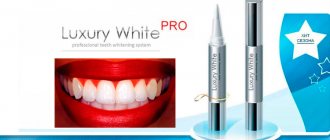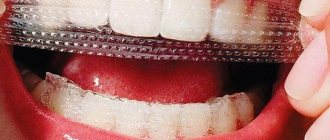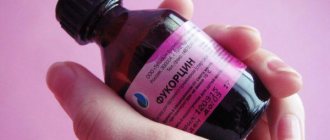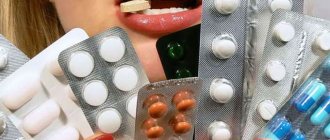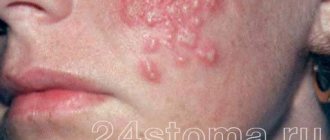Author of the article:
Soldatova Lyudmila Nikolaevna
Candidate of Medical Sciences, Professor of the Department of Clinical Dentistry of the St. Petersburg Medical and Social Institute, Chief Physician of the Alfa-Dent Dental Clinic, St. Petersburg
Propolis is a sticky, resinous substance that bees use to seal holes in the hive and disinfect the cells. Propolis consists of resins from the spring buds of birch, alder or poplar, modified with enzymes.
The miraculous properties of this natural building material have been noticed by people for a long time. Our ancestors used propolis to treat gums. And today, bee products are considered one of the most effective means for combating various dental diseases. Such substances are used both in pure form and in tinctures, ointments and sprays.
You can purchase medicines containing propolis in almost every pharmacy. There is a wide selection of ready-made tinctures for rinsing, ointments and toothpastes based on it.
We will tell you how to properly treat gums with propolis, as well as its beneficial properties and limitations in use.
How to rinse your mouth for gum inflammation: effective rinses
Swelling of the tissues of the lower or upper jaw may not always be associated with caries. To relieve redness and pain, you have to resort to the use of medications or use traditional methods. In the article we will tell you how you can rinse your mouth and teeth if your sore gums are inflamed, what pharmaceutical rinses are best for inflammation, and whether there are alternative solutions for pain.
Propolis tincture for the treatment of dental cysts
The cyst usually appears between the jawbone and the root of the tooth due to infection. Inside the formation is pus or cystic fluid.
An infusion made from bee glue with alcohol is used as an adjuvant therapy due to its ability to eliminate inflammation and antibacterial action. However, natural medicine helps only in the early stages of cyst development with mandatory supervision by a dentist.
Types of inflammatory and dystrophic gum diseases
Inflammatory manifestations include:
- Gingivitis
- Periodontitis
Dystrophic manifestations include:
Gingivitis: signs, causes and treatment
Gingivitis is the first stage of inflammation, in which the integrity of the periodontal junction has not yet been compromised. This disease can be identified by the following signs:
- Swelling of the gums.
- Blood while brushing teeth.
- Pain when eating cold, hot or solid foods.
Improper brushing of teeth, errors during fillings and dentures, improper bite – all this can cause gingivitis. By the way, this is one of the most popular problems that pediatric dentists encounter.
Treatment of gingivitis involves a set of procedures carried out in a dental clinic and at home. If there is dental plaque, it is necessary to carry out ultrasonic cleaning. In addition, you should pay more attention to hygiene: brush your teeth properly and use antibacterial agents.
Periodontitis
Periodontitis is a pathology that occurs as a result of advanced gingivitis. In this case, the swelling of the gums becomes even stronger, they begin to bleed frequently. If left untreated, infection and pus may form. As a result, the bone tissue begins to atrophy, and this leads to increased sensitivity of the teeth, their mobility, and sometimes even loss.
Treatment of periodontitis is prescribed taking into account the course of the disease. At first, procedures such as removing plaque from the enamel and regular brushing of teeth with antiseptic agents may be sufficient. In more serious situations, when the infection has penetrated deep into the bone tissue, surgery may be necessary:
- Partial gum excision.
- Cleaning periodontal pockets.
- Implantation of bone tissue substitutes.
Periodontal disease
Periodontal disease is a systemic disease. As a rule, it is typical for elderly patients. Inflammatory-dystrophic manifestations in this case are concentrated in the periodontal tissue.
Periodontal disease develops at a leisurely pace, gradually erasing tooth enamel. The presence of this disease can be determined by exposed tooth roots and cervical chips of tooth enamel. In most cases, no pain occurs, but if you ignore the problem, you can “lose” your teeth.
To eliminate periodontal disease, it is necessary not only to observe and treat the dentist, but also to related specialists.
Treatment of inflammation at home
The course of treatment of teeth and gums is always selected taking into account the individual characteristics of the disease:
- A type of inflammatory process.
- Neglect of pathology.
- Patient's age.
For example, in adult patients, inflammatory processes most often occur due to chronic diseases. To eliminate the problem, as a rule, pharmaceutical products are required - antiseptics, gels, ointments, antibiotics, toothpastes. If a child’s gums become inflamed, this is almost always associated with teething and herbal medicine, that is, rinsing with herbal decoctions and using other methods of traditional medicine, is sufficient for treatment.
Whatever the situation, adequate treatment is only possible after consultation and diagnosis by a qualified doctor. Remember that the wrong choice of procedures can not only fail to produce results, but also cause painful complications.
Antiseptics
Rinsing with antiseptic agents is the most important step in the fight against inflammatory processes. Let's name well-proven drugs that can be purchased at the pharmacy:
- Malavit - reduces inflammation and prevents its development, but does not eliminate pain effectively enough.
- Kamistad – recommended in the presence of severe pain. It also copes well with swelling.
- Chlorhexidine is a suitable treatment for gingivitis in children. Daily rinsing after meals is recommended.
- Listerine is a good drug for eliminating swelling. Suitable for all types of gum inflammation.
- Stomatophyte is an antiseptic made from natural raw materials: chamomile flowers, oak bark and sage leaves.
- Furacilin is an excellent antimicrobial agent. Penetrates inside the microbial cell, preventing its division.
- Miramistin is an anti-inflammatory drug with a pronounced antimicrobial effect.
Gels and ointments
Therapeutic gels and ointments are applied to the inflamed gums after rinsing with antiseptic agents. They provide effective protection to the mucous membrane, preventing infection from entering wounds and helping to cope with pain.
List of the most effective gels and ointments:
- Metrogyl Denta is a powerful antiseptic gel. It has pronounced anti-inflammatory and analgesic properties.
- Cholisal is one of the best options for combating inflammation that occurs due to internal reasons. Relieves pain well.
- Kamistad - suitable for both preventing gingivitis and combating complications (severe swelling, pain).
- Gengigel is an excellent healing agent. Improves blood supply, promoting rapid healing of wounds in the oral cavity.
- Stomatophyte A – recommended for severe and prolonged pain.
- Asepta - contains propolis, which provides accelerated tissue regeneration and reduces inflammation.
- Solcoseryl is a healing agent with a pronounced anesthetic effect.
To eliminate pain in children, the following remedies are recommended:
- Kamistad gel.
- Traumeel C.
- Cholisal gel.
Antibiotics
Antiseptics, gels and ointments are effective only if the inflammation is on the surface. In advanced cases, when the infection has penetrated into the deep layers of the periodontium, oral antibiotics are much more effective. The most effective means for eliminating purulent processes inside the gums:
- Metronidazole.
- Lincomycin.
- Amoxicillin.
To relieve inflammation and pain:
- Diclofenac.
- Allontoin.
- Tavegil.
Important: a periodontist should prescribe antibiotics and select the dosage. Taking medications without prior consultation can lead to unpredictable consequences.
Medicinal toothpastes
“Lakalut”, “Paradontax”, “President” - the effectiveness of these toothpastes has been scientifically proven. They effectively cope with gingivitis and many other inflammations, and are also excellent for prevention. Dentists recommend using these hygiene products for a month, after which you take a short break.
Traditional methods of combating gum inflammation
To combat inflammation and pain at home, there is a wide range of medicinal plants. The effectiveness of recipes has been tested for centuries. However, as is the case with the use of products sold in pharmacies, to achieve the desired result and to avoid side effects, it is recommended to first consult a dentist.
Bee recipes
Propolis is used in different forms for inflammation of the oral cavity. To relieve pain, it is recommended to chew a piece of bee glue for a while or apply ointment with propolis. Alcohol tinctures effectively remove plaque from teeth. And for periodontal disease, rinsing with aqueous solutions is used.
Homemade propolis toothpaste
Eliminates unpleasant odor, makes teeth white and strong. The paste is an excellent prevention of gum disease and promotes wound healing. To do it, you will need:
- 10 g propolis;
- 1 tbsp. l. alcohol;
- 1 tablet of ascorbic acid.
Grind the bee glue and add water. Remove any debris that floats to the surface. Collect the rest of the mass and dry it, grind it into powder. Stir together with alcohol and ascorbic acid. Add the resulting mixture to a tube of regular toothpaste in a ratio of 1:10.
Toothpaste with white clay and honey
There is another recipe for toothpaste based on alcohol tincture. Take:
- 2 tbsp. l. white clay;
- 6–7 drops of bee glue tincture;
- 1 tsp. honey;
- a couple of drops of mint essential oil.
Mix the clay with a small amount of water to a thick consistency. Add the remaining ingredients and mix well. This paste can be stored in the refrigerator for a long time, and it is recommended to brush your teeth with it up to 4 times a week.
Gum strengthener
To prevent your teeth from becoming loose, use an alcohol infusion of bee glue. To prepare it you will need:
- 100 ml of alcohol or vodka;
- 20–30 g of bee product.
Grind the bee glue with a knife or grater and add water. When unwanted impurities float to the top, remove them. Dry the rest of the mixture and fill it with alcohol. Keep in a dark place for at least a week, shaking daily. Then filter and store in the refrigerator.
To rinse, pour a teaspoon of extract into 200 ml of water at room temperature. Rinse your mouth in the morning after brushing and several times a day. Propolis tincture for rinsing destroys pathogenic microorganisms and cleanses gums and teeth of food particles.
To enhance the therapeutic effect, you can add various decoctions to the tincture: chamomile, calendula, calamus root, flaxseed, oak bark, salvia.
Herbal decoctions are simmered in a water bath. Then a tablespoon of the finished product is dissolved in a glass of water and 30 drops of propolis extract are added. Daily irrigation of the mouth helps quickly cure gingivitis and stomatitis.
Rinse aid
In cases where alcohol extract is contraindicated, an aqueous solution of propolis is used for rinsing. To do this you will need:
- 30 g bee resin;
- 0.5 liters of water.
Pour the crushed glue with water and simmer in a water bath until it dissolves. Cool, filter. The finished product is stored for a week.
For severe inflammation
Take:
- 30 g propolis;
- 250 ml alcohol;
- 50 g dried St. John's wort leaf.
Pour alcohol into the resin and wait until it completely dissolves. Add St. John's wort. Leave for 2 weeks. To rinse, add 30 drops of tincture to 200 ml of water. Carry out the manipulation 4-5 times a day.
Periodontal disease: symptoms and treatment
The disease begins with a slight itching of the gums, then, as the gums recede and the atrophic process progresses, food begins to increasingly enter the interdental spaces and create discomfort.
In advanced cases, without a timely treatment course, the disease enters the active phase, which can quickly result in tooth loss. The main emphasis in treatment must be on eliminating the root cause of the disease, namely periodontal disease, treatment should be not only local, but also comprehensive. Without stabilizing the underlying diseases in the body, it is impossible to achieve stabilization of periodontal disease.
Reviews about treatment with propolis tincture are mostly positive. Users report that the medicine relieves periodontal disease, relieves toothache, and improves the color of tooth enamel.
I have had bad teeth since I was a teenager. I regularly treat periodontal disease. The doctor recommended rinsing with propolis tincture. I did it 3 times a day. Within a couple of weeks I forgot about the symptoms.
Svetlana, 45 years old
After pregnancy, my teeth deteriorated greatly. Regularly treated caries. I read that you can do prophylaxis with propolis tincture. I rinsed and made lotions. A month later I noticed that the bleeding had disappeared and my teeth began to hurt less.
How does propolis affect teeth and enamel?
What is the beneficial effect of bee glue on tooth enamel and gums? The explanation lies in the component composition of the bond.
Useful components are obtained from substances extracted from tree buds and enzymes that insects use to process the material. The third part of the bond is beeswax, half is resin. These components help in the formation of a protective film and disinfection.
Favorable action:
- healing of wounds, damage to the mucous membrane;
- bactericidal, destructive effect on Candida fungi;
- pain relief during regular procedures;
- elimination of irritation and signs of inflammation;
- saturation with useful substances;
- formation of a protective layer over gum tissue and tooth enamel;
- activation of regeneration processes;
- removal and prevention of deposits and plaque.
The combination of these healing properties in one product gives bee glue a therapeutic effect in the fight against dental problems. Among the beneficial qualities, slight lightening of the surface of the teeth, the return of a smile and a healthy appearance are noted.
Propolis.
This amazing compound produced by bees contains over 100 different substances. In addition, it is a wonderful antiseptic that does not allow any types of microbes to pass through and blocks the work of their enzymes (so microorganisms will not be able to gain a foothold on the target object).
Propolis is also quite effective in helping with toothache. However, it works great as a dental protection for preventive purposes. Its effect is possible both in its natural form and as part of an alcohol tincture. In addition, it can replace novocaine (they say that it is even better) if you soak a cotton swab in its tincture and apply it to the aching tooth.
Although this does not cancel a visit to the dentist, you will definitely need to visit him.
Decoctions and infusions of herbs with the addition of propolis
Decoctions and infusions made from a mixture of herbs with the addition of propolis have an undeniable healing effect. You can take 20 grams of flax seeds, 25 grams of dried chamomile, 25 grams of linden and 30 grams of eucalyptus leaves. Everything is mixed, a tablespoon of the mixture is poured into two glasses of water and placed in a water bath for 15 minutes. Then the medicine is filtered and infused for another 30 minutes. Before use, add 40 drops of alcohol tincture of bee glue to the cooled broth. It is recommended to rinse at least four times a day.
How to get rid of toothache
There are many ways to get rid of toothache. But all of them should be used only as a means of first aid. They can reduce pain or even completely remove it. But the cause of the problem will not be eliminated. Only dental treatment can completely relieve suffering and prevent complications.
Medicines for toothache
The fastest and most effective method of toothache pain relief
- This is taking medication. But you should not self-medicate; you need to take the medications prescribed by the doctor. Many tablets irritate the gastrointestinal tract and may cause other side effects. In any case, even if there are no contraindications to taking the medicine, it should not be taken for more than 3 days. This is a method that should be used in emergency cases, the tablets will help relieve suffering before visiting a doctor.
Most effective for toothache
such drugs:
- all drugs based on ketoprofen - “Ketorolac”, “Ketanov”, “Ketorol”;
- “Ibuprofen” and other products based on it – “Mig”, “Nurofen”, “Faspik”;
- "Nimesulide", "Nise";
- "Indomethacin".
Contraindications and possible harm
The healing properties of bee glue do not eliminate the presence of contraindications. Restrictions include:
- allergic reaction;
- diseases of the liver, gall bladder, kidneys, pancreas;
- bronchial asthma, diathesis.
Propolis is not harmful specifically to teeth. Possible side effects are observed with an allergic reaction (itching, redness, burning and fever). If the concentration of the tincture is exceeded, a burn to the gums or mucous membrane is possible.
Bee glue is a common remedy for treating oral problems. Main properties: bactericidal, relieves inflammation and pain. Saturation with a large number of useful substances helps to strengthen, slightly lighten tooth enamel, and eliminate bleeding gums.
Category Hygiene Published by Mister stomatolog
Treatment of gums at home
How to treat inflammation? There are many ways to treat gum inflammation at home. Dentists usually recommend antiseptic drugs with anti-inflammatory effects. The optimal treatment regimen is prescribed by the dentist after diagnosis. Let's consider the most effective treatment options.
Rinse with solutions
Rinsing with special solutions helps to quickly get rid of pain and stop inflammatory processes occurring in soft tissues. The compositions of the solutions disinfect the surface of the gums, destroying pathogenic bacteria. It is necessary to rinse your gums after every meal, 2 to 4 times a day. Some drugs in this group are used in pure form, others must be diluted in water.
To treat inflamed gums, dentists usually prescribe the following solutions:
- Furacilin;
- Chlorhexidine;
- Miramistin;
- Rotokan;
- Stomatophyte;
- Malavit;
- Listerine;
- Chlorophyllipt.
The listed drugs are usually used to prevent diseases of the oral cavity, reduce pain and reduce inflammation, but do not apply to independent means of treatment. Therefore, rinsing is usually prescribed in combination with other procedures.
Cleaning and rinsing with an irrigator with special solutions
Treatment of gum inflammation at home is possible with the help of an irrigator - a modern oral care device that is more effective than a toothbrush. The principle of operation is based on the directed supply of a stream of water, which helps to clean even hard-to-reach places.
For inflamed gums, an irrigator becomes indispensable: unlike a toothbrush, it does not injure the gums, the jet pressure can be adjusted, and most importantly, medicinal solutions and rinses can be placed in the device.
The following solutions are suitable for use in the irrigator:
- Donfeel. Available in two forms: for daily use and dental treatment. The composition includes only natural ingredients and a vitamin complex, extracts of medicinal plants such as mint, chamomile, calendula, lemon balm. Thanks to this, the solution has a calming effect and is suitable for children and adults.
- Peridex. Professional care product containing 0.2% chlorhexidine. Widely used for therapeutic purposes, it effectively destroys pathogenic bacteria.
- PerioGard. Antiseptic based on chlorhexidine, eliminates plaque, prevents the development of gingivitis.
- Asepta. A multi-purpose solution used to remove bacterial plaque and has a wound healing effect.
The advantages of using an irrigator when treating gums include a gentle effect on inflamed tissue and absolute painlessness.
Healing ointments and gels
To treat pain in the gums at home, you can use local remedies: ointments and gels with an antiseptic effect. They enhance the effect of rinses and complement other types of treatment. Such means include:
- Metrogyl Denta is an antimicrobial drug created on the basis of two antibacterial components: chlorhexidine and metronidazole;
- Periodontocyte – contains extracts of medicinal plants: mint, sage, cloves and oregano;
- Gengigel – contains hyaluronic acid, promotes tissue regeneration;
- Stomatofit A – gives an analgesic effect, used for long-term therapeutic effects;
- Cholisal - used for local anesthesia, has an antimicrobial effect;
- Asepta is a propolis-based balm with a wound-healing effect, helps fight bleeding;
- Solcoseryl is a strong anesthetic that promotes rapid restoration of the mucous membrane;
- Dental – relieves swelling, eliminates pain;
- Revive – restores calcium levels and strengthens tooth enamel.
All ointments and gels form a protective film on the surface of the mucous membranes, which gives a long-lasting effect.
Toothpastes
For inflamed gums, you should use special toothpastes. These are pharmaceutical products made on the basis of extracts of medicinal herbs and medicinal plants. Such pastes are used strictly as prescribed by the doctor and applied to the teeth and gums. Treatment is carried out in courses, no more than 1 month each, after which a break is taken.
Antibiotics
Prescribed in complicated and advanced cases when other treatment methods do not work. The attending physician prescribes antibiotics based on the etiology of the disease. Taking medications from this group on your own is prohibited. Self-medication can worsen the patient's condition and often causes side effects.
The maximum effect from treating gums with antibiotics can only be achieved in combination, combining medications with irrigators, gels and rinses.
Vitamins
Vitamin complexes are an auxiliary therapeutic technique that complements other treatment methods. They compensate for the lack of useful enzymes in the body that are needed to strengthen tooth enamel and soft tissues. For inflammation and bleeding of the gums, vitamins of the following groups are usually prescribed: A, B, C, K, E, PP.
Herbal infusions
What to do if your gums are inflamed and painful? How to treat gum inflammation at home if there is no pharmacy nearby and you can’t get to a doctor? In an emergency, you can use medicinal rinses that have an anti-inflammatory and healing effect:
- Sage – application: a spoonful of dried inflorescences per glass of boiling water;
- Calendula – brew a teaspoon in 200 ml of water, leave for half an hour;
- Oak bark - boil 2 tablespoons in 0.5 liters of water, let stand for 10 minutes, then strain through cheesecloth;
- Yarrow – 2 tablespoons of flowers are added to 0.5 liters of water, boiled for 15 minutes, then cooled;
- Chamomile – 1 tablespoon per 200 ml of boiling water, leave for 40 minutes.
Indications for use
Before you start treating your gums with propolis, make sure that this remedy is suitable for you. No matter how miraculous the product may be, its effectiveness is limited. And besides, even the most harmless medicines have contraindications.
It is recommended to use ointments and infusions based on propolis in the following cases:
Propolis has only one contraindication – allergies. Therefore, if you have never used this product before, test the reaction. Anoint a small area of skin on the elbow or wrist with tincture/pure propolis. If the area turns red, a rash appears, or itching begins, then you will have to stop using propolis and other bee products.
The benefits of propolis in toothpastes
Today on the shelves of stores and pharmacies you can find many toothpastes that contain propolis. These products are used to prevent inflammation of the mucous membrane, strengthen and reduce sensitivity of the gums, and in the complex treatment of gingivitis and periodontitis. They have a good antimicrobial and pronounced anti-inflammatory effect, help restore the balance of microflora and strengthen local immunity. Examples of such toothpastes: “Asepta”, “Forest Balm1” for healthy gums with propolis, Biomed PROPOLINE, PresiDENT Exclusive.
Such pastes have a good antimicrobial and pronounced anti-inflammatory effect.
Notice
: Undefined variable: post_id in
/home/c/ch75405/public_html/wp-content/themes/UltraSmile/single-item.php
on line
45 Notice
: Undefined variable: full in
/home/c/ch75405/public_html/wp-content /themes/UltraSmile/single-item.php
on line
46
Rate this article:
( 3 ratings, average: 3.67 out of 5)
gum disease
- Mikhalchenko V.F., Patrusheva M.S., Yakovlev A.T. The influence of medicinal complexes “Asepta” and “Forest Balsam” on clinical parameters and activity of gingival fluid enzymes in patients with mild periodontitis / Bulletin of new medical technologies. – 2012.
Consulting specialist
Dzagurova Elina Ruslanovna
Doctor rating: 9.5 out of 10 (2) Specialization: Dentist-therapist Experience: 11 years



